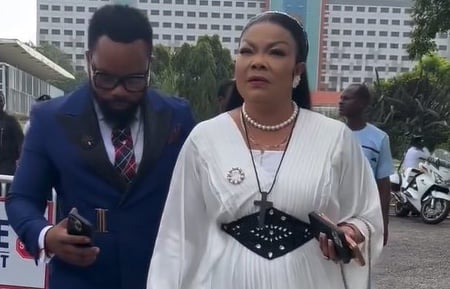The sentencing of Nana Agradaa, a self-proclaimed evangelist formerly known as Patricia Asiedu, to 15 years imprisonment with hard labor has sparked debate about the proportionality of the punishment. Agradaa, the leader of the Heaven Way Church in Weija, was convicted by an Accra Circuit Court on charges of charlatanic advertisement and defrauding by false pretenses. The charges stemmed from a televised broadcast in 2022 where she promised to double the money of anyone who gave her a sum of cash, a scheme popularly known as “Sika Gari.” This broadcast lured numerous individuals into handing over significant amounts of money with the expectation of miraculous financial returns, only to be left disappointed and financially exploited. Godwin Edudzi Tamaklo, a legal practitioner and Acting Chief Executive Officer of the National Petroleum Authority (NPA), has publicly questioned the severity of the sentence, arguing that 15 years is excessive for a first-time offender.
The case against Nana Agradaa highlights the complex interplay between religious belief, financial vulnerability, and the potential for exploitation. Agradaa, having transitioned from a traditional fetish priestess to a Christian evangelist, leveraged her spiritual authority and the trust placed in her by her followers to perpetrate the “Sika Gari” scheme. Her promise of doubling money resonated with individuals seeking financial breakthroughs, tapping into the deep-seated desire for economic improvement and the belief in supernatural intervention. The televised nature of her offer amplified its reach, drawing in a wider audience and increasing the scale of the deception. The subsequent arrest and conviction underscore the legal ramifications of exploiting religious faith for personal gain and defrauding vulnerable individuals.
The controversy surrounding the 15-year sentence lies in the perceived harshness of the punishment for a first-time offense. Mr. Tamaklo’s argument for a lighter sentence raises questions about the principles of proportionality and rehabilitation within the criminal justice system. While acknowledging the seriousness of defrauding a large number of people, he suggests that a less severe punishment could still serve as a deterrent while also allowing for the possibility of rehabilitation and reintegration into society. The debate prompts a broader discussion about the purpose of incarceration – whether it should primarily focus on punishment or also prioritize rehabilitation and the potential for reform.
The case also brings into focus the issue of charlatanism within religious contexts. Agradaa’s transition from a fetish priestess to an evangelist did not erase the underlying practices of manipulating belief systems for personal profit. The “Sika Gari” scheme exemplifies how charismatic figures can exploit the faith and trust of their followers for financial gain. This incident serves as a cautionary tale about the potential for abuse within religious communities and the importance of critical thinking and skepticism, even when confronted with seemingly miraculous promises.
The victims of Nana Agradaa’s scheme, who entrusted their hard-earned money to her with the hope of financial improvement, were left with a profound sense of betrayal and financial hardship. Their testimonials and lamentations captured in videos circulating online painted a picture of disillusionment and the devastating impact of the fraud. The case underscores the vulnerability of individuals seeking financial stability and the ease with which they can fall prey to deceptive schemes, particularly when those schemes are presented under the guise of religious authority.
The sentencing of Nana Agradaa serves as a significant legal precedent in Ghana, highlighting the legal repercussions of exploiting religious faith for financial gain and engaging in fraudulent activities. The debate surrounding the length of her sentence contributes to a broader discussion about the principles of sentencing, the balance between punishment and rehabilitation, and the need for safeguards against charlatanism within religious communities. The case also serves as a stark reminder of the vulnerability of individuals seeking financial improvement and the importance of critical thinking and skepticism in the face of promises that seem too good to be true.











